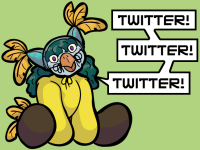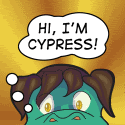Who Else Wants Awesome Readership Statstics? (Hint: It involves Google!)
My Dad influences me than I care to admit. Even when it comes to Last Resort, he ended up getting me to try out blogging on the comic, and so it's no surprise that I'm also trying out Google Analytics now (after much insistance) as well. Granted, I only did it after I decided the stats I was receiving from Xepher already weren't 'good enough', but...
What It Is: Stat tracking. Keeps up with visitors, pageviews, bounce rate (how many people only look at the first page), time spent on the site, where they come from (but not where they go), etc. Try different things on your page to tweak the numbers, and track stuff going on. Did I mention it's a free Google product?
Why You Care: Why DON'T you care? Starting a comic means finding some way to get readers, and this allows you to not only keep track of who visits, but where they go, what they see, how they get there, and (possibly most importantly) when they leave. Granted, certain 'goals' may not be as useful for someone doing comics as it is for a normal online business, but if and when you realize certain pages are bringing in the traffic over others, you take notice.
How It Works: Set up an Analytics account under your normal Google account. Add in a little javascript cookie to the bottom of all the pages on your site (if you're smart and coded in php like a good Lazy Hacker, this should only involve adding it to the footer file). Wait a day or two for your first results. Tweak accordingly.
My Attempts: Unfortunately, I'm not going to be able to give a full analysis of the 'benefits' of this until I complete the first comic cycle in a week (in order to give the whole "70% new vistors" thing to calm down a bit) , so I can only glean out bits and pieces of information from working this so far.
- I've got a frickin' high bounce rate. Granted, it's a comic on a page with very little other additional information, so either a lot of people are turning away from the comic on the first go, or there's a lot of people who just read it and then go on.
- My exit rate on the first comic ain't that great either. Probably as time goes on, I'll need to include some more information on it, like commentary and stuff.
- My exit rate on the first comic ain't that great either. Probably as time goes on, I'll need to include some more information on it, like commentary and stuff.
- I have some . . . interesting results from being able to get more information from referrals than just who came from where. I'm not surprised that I had several other xepher.net sites referring to me; that's just the newsbox. That DeviantArt still brings in good traffic is surprising (considering that I thought nobody went to that account).
- According to the pages-per-visit information, I seem to get 'better' traffic from it too (as opposed to the Belfry, which brings in a lot of traffic, but not much that sticks around for very long) The obvious drawback is that it's all from spots that don't bring in 'much' traffic individually.
- According to the pages-per-visit information, I seem to get 'better' traffic from it too (as opposed to the Belfry, which brings in a lot of traffic, but not much that sticks around for very long) The obvious drawback is that it's all from spots that don't bring in 'much' traffic individually.
- A lot of the more 'interesting' search strings have disappeared now; I suspect it's from moving the blog to different hosting. I've started a secondary profile for it, so the results from that should come in soon.
- Lots of people are still using lastresort.xepher.net instead of www.lastres0rt.com. And that includes direct traffic.
- Whichever one of you came here using their Nintendo Wii: You cracked me up when I saw that stat. You rock!
Labels: advertising, last resort, lazy hacker, search, statistics, tips






